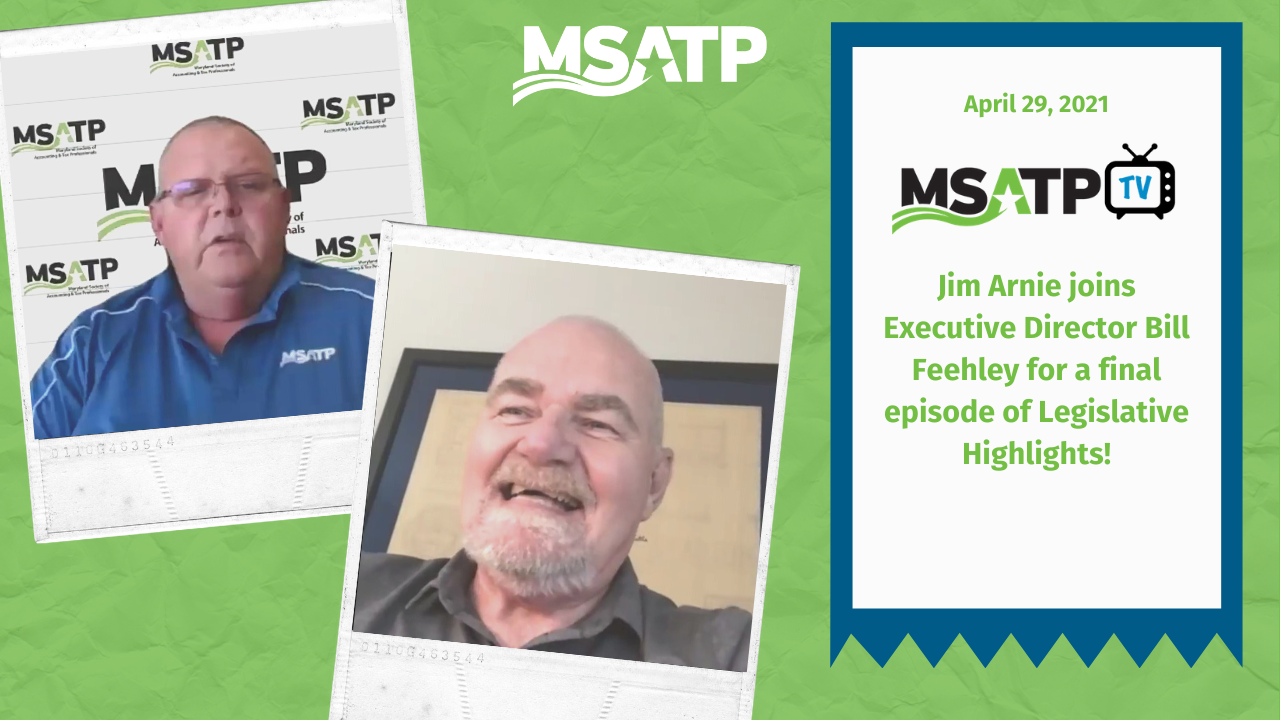News for Your Week Ahead: April 30, 2021

On this weeks’ episode of MSATP TV Jim Arnie joins Executive Director Bill Feehley to give us a final update on the legislative session in Annapolis.
Watch on YouTube.
Coming Up: On Thursday, May 6th at 10 a.m., Ellen Silverstein will join Bill Feehley on MSATP TV to tell us more about the Annual Convention & Banquet taking place June 1-4 in Ocean City, MD. Tune in on Facebook for this episode and more!
Comptroller Franchot Offers Guidance to Businesses on Sales and Use Tax Credit
Comptroller Peter Franchot has issued a reminder and further guidance to business owners who may be eligible for a Sales and Use Tax Credit under the RELIEF Act of 2021.
“While the RELIEF Act provides much-needed help to many Marylanders affected by the COVID-19 pandemic, it also includes many complicated tax provisions for our businesses that are difficult to implement,” Comptroller Franchot said. “Our agency is determined to make it easy for business taxpayers to understand the different types of relief they may be eligible for and to simplify the process by which they receive state aid.”
The legislation authorizes eligible vendors to claim an increased tax credit ONLY for the three consecutive sales periods of March, April and May – which are typically filed in April, May and June. However, taxpayers should note that filing deadlines for those months have been extended to July 15, 2021 and will be considered “timely filed” if filed by the July 15th deadline.
For more information, click here.
IRS Suspends Requirement to Repay Excess Advance Payments of the 2020 Premium Tax Credit | 2021-55
The premium tax credit helps pay for health insurance coverage bought from the Health Insurance Marketplace. Eligible people can choose to have all, some, or none of the estimated credit paid in advance directly to their insurance company on their behalf. These payments – which are called advance payments of the premium tax credit, advance credit payments, or APTC – lower what taxpayers pay out-of-pocket for their monthly premiums.
Alternatively, people can choose not to get APTC, pay the full amount of their monthly premium, and claim all the benefit of the PTC that they are allowed when they file their tax return. This will increase their refund or lower the amount of tax they owe. Taxpayers use Form 8962, Premium Tax Credit to figure the amount of their PTC and reconcile it with their APTC.
The American Rescue Plan Act of 2021 suspends the requirement that taxpayers repay their excess advance payments of the premium tax credit for tax year 2020. Excess APTC is the amount by which the taxpayer’s advance payments of the premium tax credit exceed their premium tax credit.
For more information, click here.
IRS Office of Chief Counsel’s First National Virtual Settlement Month Successful in Resolving Almost 150 Tax Court Cases | IR-2021-93
Building on the success of Settlement Days and Virtual Settlement Days, the Internal Revenue Service Office of Chief Counsel hosted its first National Virtual Settlement Month in March 2021. The results are impressive.
Settlement Days events are coordinated efforts to resolve cases in the United States Tax Court by providing taxpayers who are not represented by counsel the opportunity to receive free tax advice from Low Income Taxpayer Clinics (LITCs), American Bar Association (ABA) volunteer attorneys and other pro bono organizations.
“The March Settlement Days campaign yielded great results with well over half of participating taxpayers settling their cases on a basis agreeable to them without having to represent themselves in Tax Court,” said IRS Commissioner Chuck Rettig. “These strong results could not be achieved without the dedication and support of our partner groups–the LITCs, ABA and other pro bono organizations.”
For more information, click here.
Comptroller Announces More Than 2 Million Returns Processed | Franchot Warns Fake Collection Agency is Using Public Lien Information to Target Taxpayers
Comptroller Peter Franchot today announced the agency has processed more than two millions state tax returns in the current tax season with 1.4 million taxpayers receiving refunds totaling $1.4 billion. He also released details of another tax scam in which a fake collections agency attempts to steal Marylanders’ money.
Scammers have taken advantage of public lien information to target taxpayers. Taxpayers have received letters – correctly addressed to them – with public record lien information from an entity claiming they are a collections agency operating on behalf of the Comptroller of Maryland. The letter is not legitimate. If any individual or business taxpayer, in Maryland or out of state, receives such a letter, please contact our office immediately.
For more information, click here.
Here’s Why Some People Got More Than One Notice About Their Economic Impact Payments
After each of the three Economic Impact Payments is issued, the IRS is required to mail a notice to each recipient’s last known address. The notice provides information about the amount of the payment, how it was made and how to report any payment that wasn’t received. Some people may receive multiple notices about each payment. Most people will simply file the notice with their tax records and won’t need to contact the IRS or take any further action.
Here are some details about each notice and what action some people may need to take.
- Notice 1444, Your Economic Impact Payment. The IRS mailed this notice within 15 days after the first payment was issued in 2020. Some people received another Notice 1444 if the IRS corrected or issued more than one payment in the first round. Taxpayers who received a Notice 1444 but did not receive their first payment should review the frequently asked questions for instructions on what to do if their first payment is lost, stolen, destroyed or has not been received. People should keep this letter with tax year 2020 records.
- Notice 1444-A, You May Need to Act to Claim Your Payment. The IRS mailed this letter last year to people who typically aren’t required to file federal income tax returns but may have been eligible for the first Economic Impact Payment. People who didn’t get a first and second Economic Impact Payment or got less than the full amounts, may be eligible to claim the 2020 Recovery Rebate Credit and must file a 2020 tax return even if they don’t usually file a tax return.
- Notice 1444-B, Your Second Economic Impact Payment. The law that authorized the second payment gave the IRS more time to mail Notice 1444-B after the second payments were issued. This means people likely received their second payment several weeks before Notice 1444-B arrived. Taxpayers who received Notice 1444-B but didn’t receive the second payment should read the FAQs about what to do if their second payment is lost, stolen, destroyed or has not been received. People should keep this letter with tax year 2020 records.
- Notice 1444-C, Your 2021 Economic Impact Payment. The IRS is mailing this letter to people who received a third Economic Impact Payment. People should keep this letter with tax year 2021 records.
People should keep any IRS notices they receive about Economic Impact Payments with other tax records. The IRS cannot issue replacement copies of these notices. Taxpayers who don’t have their notices can view the amounts of their Economic Impact Payments through their online account.
For more information, please click here.



